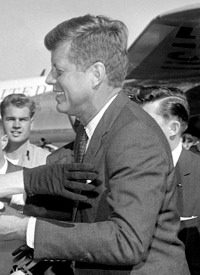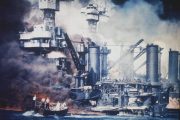
The Warren Commission concluded back in 1964 that it had “no evidence that the extreme views expressed toward President Kennedy by some rightwing groups centered in Dallas or any other general atmosphere of hate or rightwing extremism which may have existed in the city of Dallas had any connection with Oswald’s actions on November 22, 1963.”
But that hasn’t stopped an increasing number of newspaper columnists in 2011 from likening the Arizona shooting earlier this month with a supposedly similar “atmosphere of hate” in Dallas in November 1963. Since this week marks the 50th anniversary of President Kennedy’s inaugural address, it has become an occasion for even more opinion columns vainly attempting to fuse the two tragedies as the work of “right-wing hate groups.”
Washington Post columnist Michael Gerson was quick to lift the Warren Commission Report’s quote denying a “general atmosphere of hate” in his January 11 column and claim it was an established fact that Dallas was swimming in hate groups in 1963.
Likewise, John Farmer, Jr., dean of Rutgers School of Law-Newark, wrote in the New Jersey Star-Ledger January 16 about the supposed links The John Birch Society had to hate literature in Dallas at that time, referencing an anonymous “Wanted” poster accusing Kennedy of “treason.” Farmer wrote: “The ‘Wanted’ poster bearing JFK’s likeness may have been published by the John Birch Society, but it could have had any number of sources.” But the reality is that there were no real ties between The John Birch Society and the “Wanted” poster, which was highly offensive but not threatening, nor were there any ties between the “Wanted” poster and Lee Harvey Oswald. Had Farmer checked his facts, perhaps he wouldn’t have resorted to baseless innuendo.
Professor Farmer may have been conflating the “Wanted” handbill with the full-page advertisement that ran in the Dallas Morning News the day Kennedy was shot. “On the very day JFK visited Dallas and died, the local newspaper, the Dallas Morning News, featured a full-page, black-bordered anti-Kennedy advertisement prepared and paid for by persons affiliated with the John Birch Society,” wrote Donald E. Wilkes, Jr., professor of law, University of Georgia School of Law, back in 2006. Of course, “affiliated with” is a textbook example of vague weasel words that most true academics avoid. But Professor Wilkes is at least partly correct. The John Birch Society had no role in preparation or endorsement of the advertisement, but several people who purchased the advertisement were members of (or later joined) The John Birch Society.
The “Welcome to Dallas” ad in the Dallas Morning News was hardly a militant poster, however. The advertisement exclaimed that “we free-thinking and America-thinking citizens of Dallas still have, through a Constitution largely ignored by you, the right to address our grievances, to question you, to disagree with you and to criticize you.” The full page advertisement, which ran in the November 22, 1963 Dallas Morning News, went on to criticize Kennedy for the debacle at Cuba’s Bay of Pigs, increasing hostility to the United States abroad by foreign countries despite huge expenditures of U.S. foreign aid, and a general reluctance to use the executive office to prosecute communists criminally.
The “Welcome to Dallas” ad simply asked a series of questions that reflected serious policy differences with President Kennedy, nothing more.
The attack on conservatives as general messengers of hate was also resurrected recently by Madison, Wisconsin’s WISC-TV personality Bill Wineke. Wineke wrote on the television station’s website: “The 1960s were not a gentler time in American history. And they were not a more civil time. Robert Welch and his John Birch Society were the equal of any right-wing kook of today. School children in Texas cheered when they learned that Kennedy had been shot.”
Newsbusters.org’s Jack Coleman exploded this longtime liberal myth that children cheered the death of a President. The urban legend hails from Dallas’ University Park Elementary School, and here’s what really happened: “Because of the shooting, which took place at 12:30 p.m., the principal had decided to close the school early, though without telling the students why. The children at the school — including three of Barker’s own — were merely happy to be going home early, he was told. There couldn’t have been any spontaneous cheering at the news of Kennedy’s murder, because no such news had been announced.”
Yet the story that school children cheered the death of a President — promoted nationally by CBS News correspondent Dan Rather — took hold and established Dallas as a “city of hate” in the early 1960s in many American minds. Again, Wineke simply failed to check his facts.
Some veteran conservatives are almost accustomed to the falsehoods and distortions. “I was a very active [volunteer] section leader,” Larry Waters, a Dallas resident in 1963 who is now vice president of The John Birch Society, told The New American. “I was part of a group of 10 men speaking under the auspices of the Dallas Civil Defense.” Waters says that the liberal media were then chomping on the bit to blame the political “Right” for Kennedy’s assassination. “The entire atmosphere had been shaped by two or three events that had happened a couple of months before the assassination,” Waters told The New American, referring to the Dallas Morning News advertisement, the “Wanted” handbill, and a scuffle at an event by UN Ambassador Adlai Stevenson days earlier. Waters said that liberals then (and now on a national scale, apparently) “tried to make Dallas out as a city of hate. The writers in retrospect are trying to attach this to us.”
Ironically, it’s the same people on the political Left who cry loudest about hateful rhetoric who are the ones most prolifically spewing it, along with an ample helping of falsehoods and innuendo.
Disclaimer: The New American magazine is a corporate affiliate of The John Birch Society.
Photo of JFK arriving in Dallas on the day he was assassinated: AP Images



